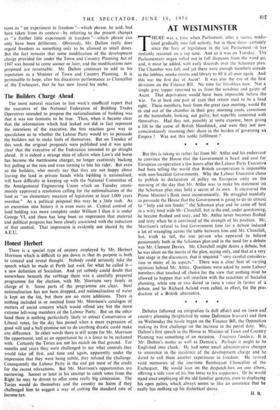AT WESTMINSTER
THERE was a time when Parliament, after a recess, modus lated gradually into full activity, but in these days—certainly
since the fury of legislation in the last Parliament—it has instantly resumed on a top note. And so it was on Tuesday. The Parliamentary organ rolled out in full diapason from the word go, and, it must be added, with early discords over the Schuman plan.
The Chamber was full, and yet there were enough members outside in the lobbies, smoke-rooms and library to fill it all over again. And
this was the first day of Ascot! It was also the eve of the first divisions on the Finance Bill. No time for frivolities now. Not a single grey topper returned to us from the sunshine and gaiety of Ascot. That deprivation would have been impossible before the war. To at least one pair of eyes that return used to be a fond sight. These members, back from the great race meeting, would flit in and out of the chamber in their grey morning coats, carnations at the buttonhole, looking, not guilty, but superbly contented with themselves. Had they not, possibly at some expense, been giving a lift to the cause of British bloodstock, and were they not now conscientiously resuming their share in the burden of governing as Empire ? Was not this noble fulfilment ?
But this is taking us rather far from Mr. Attlee and his endeavour' to convince the House that the Government is heart and soul for European co-operation a few hours after the Labour Party Executive had been telling the world that British co-operation is impossible with non-Socialist Governments. Why the Labour Executive chose to publish its declaration of policy on European unity on the morning of the day that Mr. Attlee was to make his statement on the Schuman plan may hold a secret of its own. It uncovered the Prime Minister's flank most inconveniently. He struggled manfully to persuade the House that the Government is going to do its utmost to " help and not hinder " the Schuman plan and he came off best in a witty bout with Mr. Churchill, but in the end, under questioning, he became flushed and testy, and Mr. Attlee never becomes flushed and testy when he is convinced of the strength of his position. Mr. Morrison's refusal to find Government time for a debate induced a lot of wrangling across the table between him and Mr. Churchill, but, truth to tell, the one person who appeared to believe passionately both in the Schuman plan and in the need for a debate was Mr. Clement Davies. Mr. Churchill might desire a debate, but he was silent on the merits of the plan, saying only, and that at a very late stage in the discussion, that it required " very careful considera- tion in many of its aspects." There was a clear hint of varying opinions behind Mr. Attlee. Questions were asked by some Labour` members that touched off cheers for the view that nothing must be allowed to happen that will interfere with the sanctities of Socialist planning, while one or two dared to raise a voice in favour of a debate, and Sir Richard Acland even called, in effect, for the pro., duction of a British alternative.
Debates followed on emigration (a dull affair) and on town and country planning (brightened by some Daltonian bravura) and then on Wednesday the tussle began on the Finance Bill, the Opposition making its first challenge on the increase in the petrol duty. Mr,,, Dalton's first speech in the House as Minister of Town and Country Planning was something of an occasion. Toujours !'audace. It is Mr. Dalton's motto as well as Danton's. Perhaps it ought to be Englished into cheek. He had some small administrative changes to announce in the incidence of the development charge and he dared to call them another experiment in freedom. He revived vivid memories of the one-time flamboyant Chancellor of the Exchequer. He would lean on the despatch-box on one elbow, offering a side view of his fine torso to his supporters. Or he would stand erect employing all the old familiar gestures, even to displaying his open palms, which always seems so like an assurance that he really has nothing up his dialectical sleeve.
H. B.




































 Previous page
Previous page